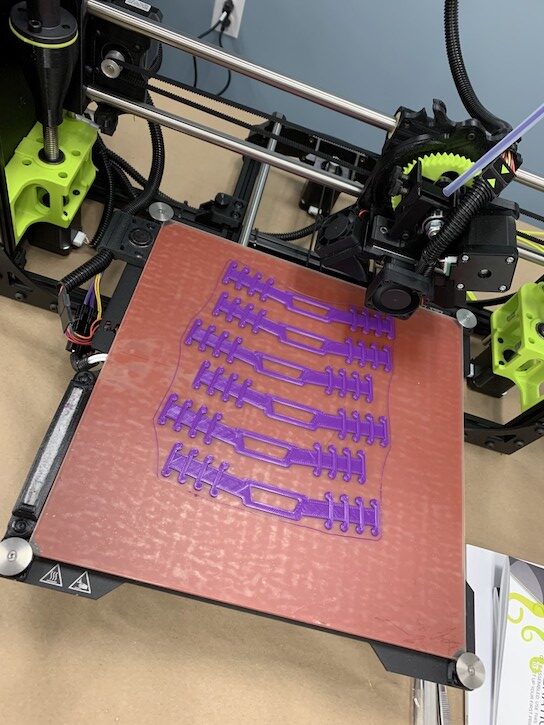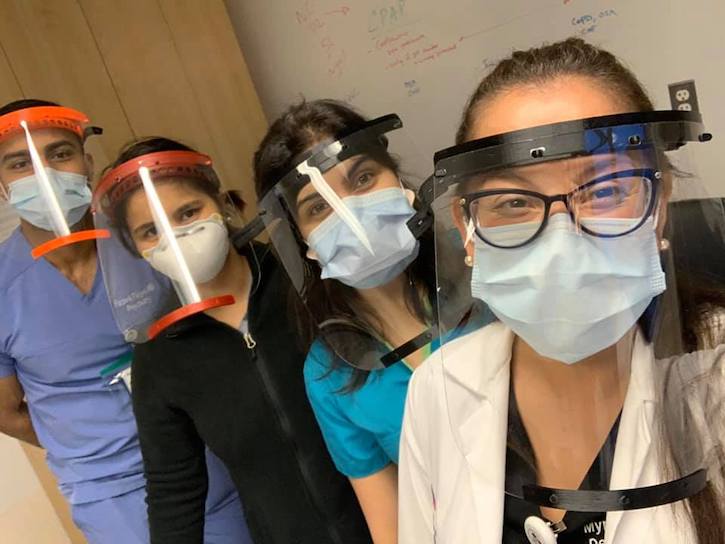E-Newsletter
Mason faculty and students innovate to battle COVID-19
George Mason University faculty members are fighting the coronavirus pandemic with research in testing, treatment, vaccine development, and in creating initiatives to help others. Mason students also are responding with innovative initiatives. Read on to find out about some of the many initiatives in Mason’s battle against COVID-19, courtesy of the hard-working team at the Communications Department of the Fairfax-based university.
Venturing for a breakthrough: Tyler Cowen, a professor of economics within Mason’s College of Humanities and Social Sciences and the faculty director of the Mercatus Center, has received a strong response to his initiative to incentivize the response to COVID-19, as generous donors have flooded his Emergent Ventures program with financial donations in the hopes of immediately slowing the global pandemic.
“People I knew who read or heard about it simply contacted us and expressed an interest in donating,” Cowen said.
Cowen helped put together the Emergent Ventures Prizes in March in the hopes of inspiring immediate breakthroughs. Initial prize money was gifted by several anonymous donors, with Emergent Ventures announcing its first four cash prize winners in late March.
Most recently, Australian software billionaire Scott Farquhar and his wife, Kim Jackson, donated $1 million to the Emergent Ventures program. SpaceX CEO and Founder Elon Musk is among the many other donors. News at Mason
Antibody testing: A multidisciplinary team of Mason scientists is developing a saliva test to detect antibodies to COVID-19. Screening of students, faculty and staff volunteers could begin as early as this summer. Mason would be one of the first universities to offer antibody research screening.
“All the different parts of the Mason research ecosystem are bringing their expertise together for this worthy purpose,” said Lance Liotta, the lead researcher and the co-director and co-founder of Mason’s Center for Applied Proteomics and Molecular Medicine (CAPMM). “The goal is to evaluate if saliva can be used instead of blood for ease of screening for COVID-19 antibodies.”
“This could have far-reaching impact for the local community, Virginia, the United States, and the entire world if an accurate method can be achieved and rigorously validated,” added Emanuel Petricoin, co-director of CAPMM. News at Mason
Comfort in the crisis: Mason’s Forensic Science and Police and Public Safety departments teamed up to help medical personnel during the fight against COVID-19. Using 3D technology, the team is making plastic extended straps that will allow medical personnel to more comfortably wear the protective N95 masks for long periods while treating patients. News at Mason

Mason’s Forensic and Police and Public Safety departments are using 3D technology to make plastic extended straps that will allow medical personnel to more comfortably wear protective masks. (Photo, George Mason University)
Tracking migrant workers: Mason Engineering’s Leigh McCue, an associate professor in the Department of Mechanical Engineering, developed a virtual tool to help farm owners across the United States learn how COVID-19 spreads among the migrant worker community. News at Mason
Ventilation warning: Rainald Löhner, director of Mason’s Center for Computational Fluid Dynamics and an expert in the dispersion of contaminants, is warning hospitals treating COVID-19 patients that their ventilation systems might inadvertently spread the virus and put medical personnel at more risk. Löhner said that he suspects that the role of ventilation systems in the spread of the virus is being overlooked. News at Mason
Don’t panic then forget: Now is the time to prepare for the next public health threat, says epidemiologist Kathryn H. Jacobsen, a professor specializing in global heath epidemiology in Mason’s College of Health and Human Services. Jacobsen said that a cycle of “panic then forget” happens when people return to old habits soon after a threat has passed. Jacobsen says now is the time to establish structures that will enable us to detect and respond to future outbreaks quickly. News at Mason
Repurposing drugs: Fatah Kashanchi, a professor of virology at Mason and director of the Laboratory of Molecular Virology, and his team are experimenting with drugs for a possible COVID-19 treatment that can be rapidly absorbed into the lungs to stop the devastating progression of cell infections. The key, Kashanchi said, is using repurposed drugs, some of which have been used against HIV, that are already approved by the FDA. The drugs can be put to immediate use if found effective against COVID-19, whereas a vaccine is likely at least a year or more away. News at Mason

Professor Fatah Kashanchi (far right) meets with bioscience graduate students (from left) Catherine DeMarino, Michelle Pleet and Alex Barclay from the School of Systems Biology, College of Science. (Photo, George Mason University)
Mask-making from home: Mason mechanical engineering junior Dhawal Bhanderi is showing his entrepreneurial spirit to help protect first-responders during the coronavirus pandemic by making protective face shields with a 3D printer from his family’s home in Virginia Beach while he finishes his classes this semester remotely. News at Mason
Targeting food needs: Mason student Awad Shahadat, a sophomore computer science major, is collecting donations for local food banks through a virus-tracking website he created. With the help of his brother, Mason alumnus Zobair Shahadat, Awad created the Where’s the Corona website that uses information available from Johns Hopkins University’s Coronavirus Resource Center. News at Mason
Going deep on coronaviruses: Mason’s College of Health and Human Services received a grant from the National Science Foundation to study the emergence and spread of coronaviruses such as COVID-19, Middle East Respiratory Syndrome (MERS-CoV2), and severe acute respiratory syndrome (SARS). Dr. Amira Roess, who joined Mason’s faculty in the fall of 2019 as a professor in the Department of Global and Community Health, is the principal investigator on the grant. Roess studies the spread of MERS-CoV2, a novel coronavirus, between wildlife, camels and humans in East Africa. Mason CHHSNews
Mixing up masks: Students involved with the Mason Innovation Exchange (The MIX) are 3D-printing personal-protective equipment such as face shields and masks for health providers. The MIX is a network of spaces that enables making, venture creation and collaborative collisions. The students obtained permission to move the equipment off campus after the March 22 announcement that the university was closed. Mason News

Facial shields made by the Mason team are being put to good use. The first set was delivered to medical professionals at Elmhurst Hospital in Queens, N.Y. (Photo, George Mason University)
Smokers take note: In a paper published online March 18 by the FEBS Journal, Mason researchers Jim Olds and Nadine Kabbani warned that prior nicotine exposure can be linked to cardiopulmonary vulnerability to COVID-19. Using data and research from the 2002 severe acute respiratory syndrome (SARS) outbreak, the team predicted that individuals with nicotine exposure are “primed” to be at higher risk because nicotine can directly impact ACE2, a protein receptor on the surface of human cells that COVID-19 uses to infect cells, which leads to lung-cell damage. News at Mason
Nano-nano, the future is here: Mason virologist Kylene Kehn-Hall and her colleagues from Manassas-based Ceres Nanosciences received a $250,000 grant from New York-based Schmidt Futures to develop better ways to diagnose the coronavirus. Their work uses Nanotrap particle technology, which was invented at Mason. This technology improves diagnostic testing and life science research by capturing, concentrating, and preserving low abundance analytes from biological samples. Kehn-Hall and her team hope to develop testing that will result in fewer false-negative results. News at Mason
Find out more Mason News by clicking here.
May 7, 2020
News Travels Fast
Stay ahead of the curve with the latest business news from Northern Virginia. Receive updates on moves, incentives, workforce, events and more.